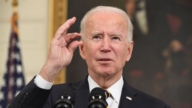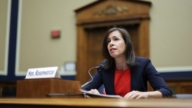【新唐人2013年11月22日讯】中共三中全会的《决定》文宣布,要废除对非公有制经济各种形式的不合理规定,消除各种隐性壁垒。按照北京的命令,银行已经增加对中小企业的借贷。但是银行并不情愿借钱给民营企业,他们利用一些漏洞,把规定给中小企业的贷款配额,用在国营企业和地方政府附属机构头上。专家分析,这些矛盾凸显了中共试图改革,但却坚持国家主导角色所面临的挣扎,也反映出习、李改革将遭遇的官僚集团阻力。
北京当局已经命令国营的银行应借贷给较小企业。但银行家们认为,借贷给小企业是他们的噩梦,因为:小企业难以评估,资产少,经济风向转变的时候可能迅速翻船。
英国《路透社》11月19号报导,中国的银行家透露,有漏洞允许他们通过借贷给国有企业、或政府实体,来达到配额。解决的方法是,使用不同的会计技巧,把给国营企业的贷款掩饰为给中小企业的贷款,比如发放贷款给小的子公司,或帮助国有企业把钱付给供应商。
交通银行一名贷款官员对《路透社》坦白说,“我们(交通银行)是国家所有的。(国有企业)公司是国家所有的。实际上我们的关系就好像兄弟。这是为什么中小企业从国营银行得不到融资。不是因为他们好或者不好。我们歧视它们是因为它们不是我们的兄弟。”
“北京天则经济研究所”所长助理段绍译认为,这件事反映出﹕在公有制主导之下,民营企业的地位注定低微。
北京天则经济研究所所长助理段绍译:“私有化程度越高的社会,它的市场经济就会越发达。中国的国有企业的比重太大,特别是银行业几乎都是国有企业。这些银行行长,他们最关心的不是银行能赚多少钱,他关心自己的帽子能不能戴稳,所以他不求有功,但求无过。”
段绍译说,在中国,银行贷款供不应求,所以银行即使不努力经营,它仍然有比较好的业绩,所以它没有必要把钱借给中小企业。
段绍译:“因为借给中小企业,第一他的单笔业务比较小,他的营运成本比较高。第二,万一出现风险的话,他们不太好说。但是如果借给国有企业出现风险亏了的话,反正是借给国家的,等于说左手借给右手,往往政府不容易去追究他们。”
此外,银行采用欺骗手段抵制中央命令,也反映出中共推行改革当中“上有政策,下有对策”的痼疾。
美国《华尔街日报》11月18号引述“渣打银行”经济学家史蒂芬•格林的话说,中共实施经济战略规划是一场“硬仗”,“在每一个领域,改革派都有清楚的想法。但是很难推动它们越过利益集团。”
比如,《华尔街日报》说,中共放开“一胎化政策”可能不太符合地方政府官僚的利益,他们将损失每年数十亿美元的“计生罚款”。
段绍译表示,中共放开计划生育政策的阻力,主要来自于计生委的官员。
段绍译:“因为计生委官员就靠这个获得利益,特别是计生委他有很大的权力,原来可以罚款,可以对其他官员的升迁进行一票否决,以至于习近平都只敢生一个女儿。可见这个计生委的权力是多么大。”
此外,三中全会宣布废除劳教制度,也会遭到司法系统和公安系统的阻力。
段绍译:“公安部门,原来的劳教所,他们利用这个特权是可以获得很多利益的。打个比方,有劳教的话,必然有人不想被劳教,那些不想被劳教的或者想早一点解除劳教的,他们就会向这些官员贿赂。甚至劳教人员给利益集团提供廉价的劳动力。”
中共总理李克强在11月1号针对地方政府改革的演讲中说,一些地方当局,为了他们自己的利益,对于中央政府的要求阳奉阴违。
而美国《彭博社》认为,习近平启动的反腐败运动,可能是警告中共官员和国有企业老板的一个方式,也就是:如果你“不听话”,我们有监狱等着你。
采访编辑/秦雪 后制/李勇
Bank boycotts new regulations of central government
In the Third Plenary Session,
the Chinese Communist Party (CCP)
made a decision to abolish irrational regulations,
mainly on non state-owned-enterprise (SOE) entities,
and removing various recessive barriers.
According to the decision, banks have increased the range of loans
to middle and small enterprises.
But banks are reluctant to lend money to private firms,
exploiting loopholes of existing regulations,
thus assigning designated loan quota’s to private firms,
SOEs and entities affiliated to local governments.
Experts say, this phenomenon highlights the struggles resulting
from central government dominating the reforms,
as well as the blockage from bureautic groups.
Beijing Authority has ordered state-owned banks to offer
loans to middle and small sized companies.
But the bankers think, the loans to small firms is a nightmare
because small companies are difficult to evaluate,
less assets and vulnerable to going bankrupt when the
economic situation abruptly changes.
Reuters report on November 19, tells of China’s bankers disclose,
managing to achieve the assigned loan quota via
existing regulatory loopholes,
making loans to SOE’s and economic entities
affiliated to the government.
Specifically, a variety of accounting skills are used
to record the loans to SOE’s as loans to middle
and small private enterprises,
thus offering loans to SOE branches, or pay the
suppliers of SOEs.
A loan official from Bank of Communication told Reuters,
“We are owned by the state, SOEs are also owned by the state.
In fact our relationship is much like siblings.
This is why small and middle private enterprises cannot
obtain finance from state-owned banks.
This is not due to their businesses being good or bad.
But more to the point, we discriminate against
them because they are not our siblings."
Assistant Director of Beijing Unirule Institute of Economics
Duan Shaoyi points out,
such an incident demonstrates, private enterprises are doomed
with menial status’s under the circumstance of
dominance of state ownership.
Duan says:"The higher the privatization of a society,
the more developed its market economy.
The share of SOEs in China is too heavy, and most
of the banks are SOE.
The biggest concern for the bank leaders is their position,
rather than any profits the bank makes.
So they’re only pursuit is to not be at fault
rather than any form of achievement."
Duan emphasizes, in China bank loans are in short supply.
Even if a bank is not well operated, it can still achieve
good performance.
Hence they have no need to give loans to the
private sector of small & medium sized companies.
Duan says:"To begin with, because their business scale is
small yet with high operation costs, If the risks are high,
the results are then hard to gage.
But if the money is loaned to SOE’s and loss happens
due to the risks taken,
the government tends not to investigate nor punish the bank,
because they are all state owned & money just runs in
& out of the different pockets of the state."
In addition, the incident whereby the bank resisted the
order of the Central Committee of the CCP,
shows the real deep-seated issues within the regime:
Once the upper levels issue a new policy,
then the local authorities invent new counter-measures.
According to Wall Street Journal on November 18,
Standard Charted economist Stephen Green said,
“The implementation of the economic plan is a ‘hard slog’,
Choose your sector. In every area, reformers have clear ideas,
but it’s hard to push them past interest groups."
Wall Street Journal reported, to loosen the “One Child Policy"
might be in-compliancewith the interests of local officials.
They are very likely to lose several billion
US dollars in revenue from any fines if the policy
is implemented towards them.
Duan expresses, the barrier of lifting the “Birth Control Policy,"
is mainly from the officials of all governmental levels of
Health and Family Planning Commission.
Duan also said: “As the Commission gains in profits
from this policy, it has powerful authority to fine
and deny the promotion of all officials.
Xi Jinping can only have one daughter.
So you see how powerful the Commission is"
In addition, to abolish the re-education institution issued
by the Third Plenary Session, will be objected by the
judicial department and police bureaus.
Duan says “Given re-education units exist, the police system
can gain many interests by exerting privilege powers
For instance, given the existence of the re-education,
It’s inevitable that someone will not want to be re-educated,
nor free from re-education ahead of time.
Then they have to bribe these officers. Furthermore,
reeducated people are cheap labor for stakeholder groups."
On his speech over the reform of local governments
on November 1st, Premier Li Keqiang said,
Some local authorities use ostensible obedience to
deal with the policies of Central Government.
Bloomberg report stated, the anti-corruption movement launched
by Xi Jingping might be a means of warning the CCP
officials and the SOEs’ heads.
In other words, if you do not follow suit, you will end up in jail.
Interview & Edit/QinXue Post-Production/LiYong



























